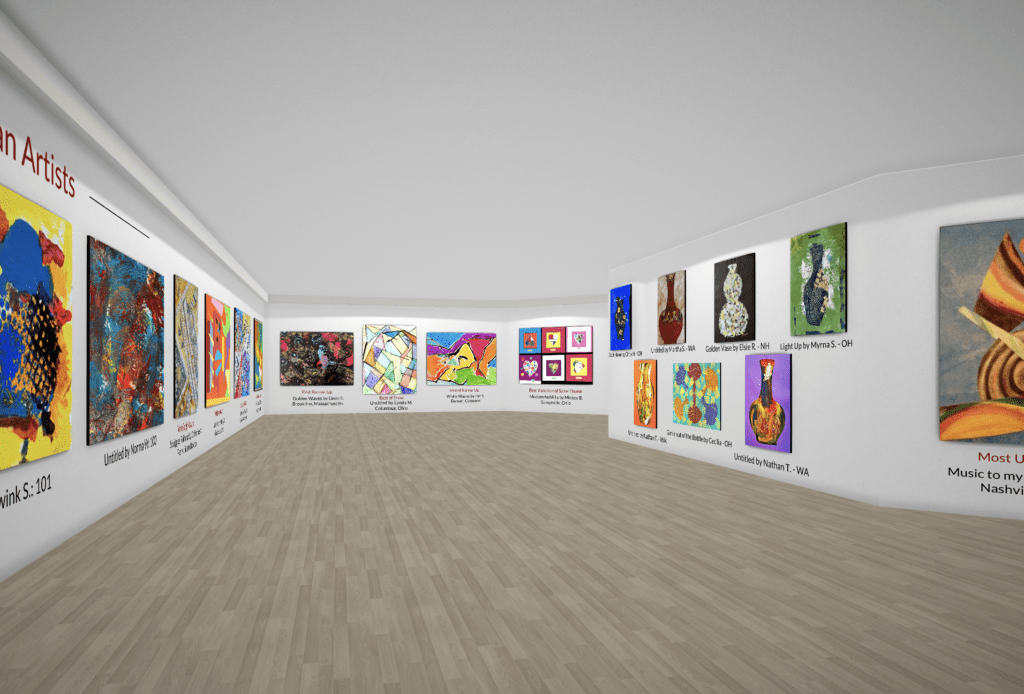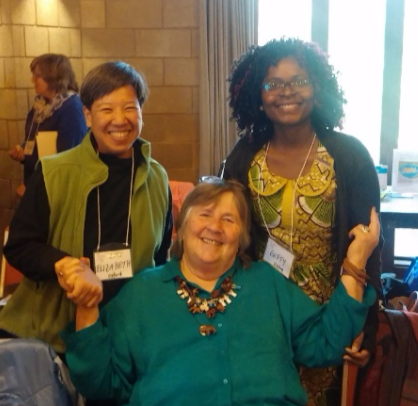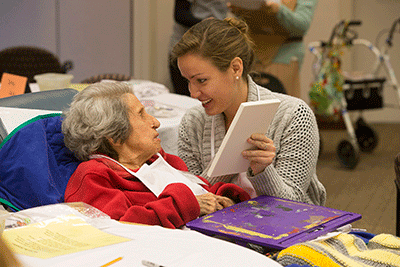They use art and music to restore what dementia takes away
December 18, 2023 written by Craig Sailor
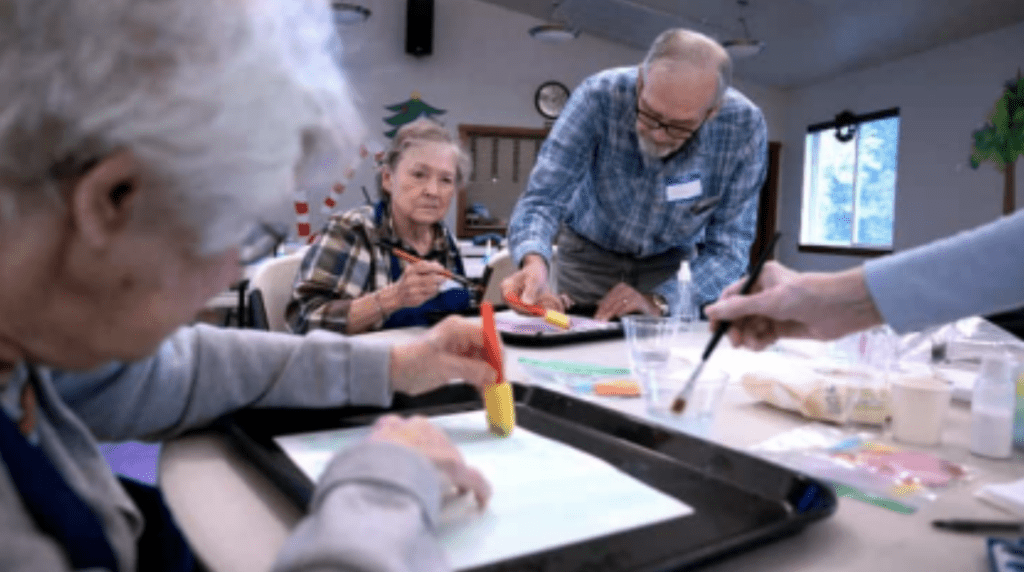
Nathan Tripp was just 14 and riding his bike on an Edgewood street when he was struck by a drunk driver. Today, he’s 52, and the traumatic brain injury he suffered as a teen has led to dementia.
A dementia diagnosis can be devastating for those who receive it. The resulting cognitive decline can affect memory, language, perception, attention, problem solving skills and movement.
Art and music can help slow the progression of the condition or at least bring moments of connection, say those who care for people with dementia and other cognitive impairments.
Tripp attends weekly classes of Opening Minds through Art in Edgewood. It’s a national program developed at Scripps Gerontology Center in Ohio. The program involves caregivers, family and volunteers to help people with dementia rely on their imagination instead of memory, emphasizing strengths rather than lost skills.
Nonprofit Lutheran Community Services Northwest runs the only Opening Minds program in Washington, according to LCS spokesperson Matt Misterek. It’s one of several aging and independent living programs LCS has in the South Sound.
NATHAN
Tripp and his mother, Cheryl Cleveland, 78, attend the weekly art classes together at Mountain View Community Center. They began online during the COVID-19 pandemic. The classes, Cleveland said, have made Tripp more engaged and communicative.
“He likes being out with people and doing art,” she said. “It’s been wonderful for us.” At first, Tripp was tentative and just content with making small marks on art paper.
“But now he can fill a whole page,” Cleveland said, whether he works in water color, paint or collage.
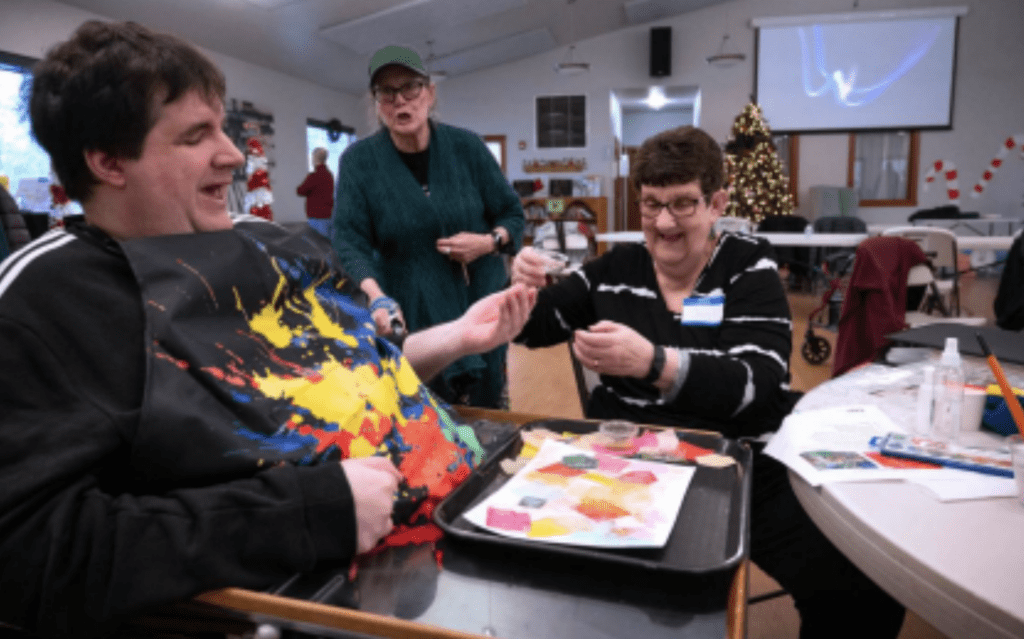
Cleveland pulled out a scrap book of his work. A variety of colors and abstract shapes fills each page, each vastly different from the other.
“I like all the mediums,” Tripp said.
INSTRUCTOR
Instructor Laurie Arndt trained with Scripps for two months before offering the classes online in September 2020. She started with two participants. Now, she has 35 in the weekly classes offered in Tacoma and Edgewood and one monthly class held in Auburn.
“This is the best job I’ve ever had,” she said.
The classes are free, and all art supplies are provided.
The art classes are preceded by a 45-minute Music & Memories class. Most of the participants attend both, Arndt said.
SYLVIA
Chris and Sylvia Thompson of Tacoma have been going to the program for three years. Sylvia, a former Lutheran pastor, has early-onset dementia.
“It’s good for me,” Sylvia, 68, said. “And I think it’s good for the other people here.”
Sylvia had few art experiences before the classes but that’s not a requirement, she said. She likes the easy-to-follow instructions and the freedom they carry.
“She’s had a few art classes but has always loved shapes and colors,” Chris, 70, said. He echoed his wife’s enthusiasm for the classes.
“It gave her a sense of purpose,” he said. “And that’s really important for anyone who is aging.”
Sylvia attends both the music and art sessions. It can be difficult to ascertain what therapies are working for people with dementia, Chris said, but he thinks both the music and art classes help her.
“No matter what her mood is before she comes, she always leaves happy,” he said.
MUSIC
The Music & Memories class incorporates a variety of styles and techniques, including sing along, chair dancing and scarf movement.
Arndt has a variety of instruments for participants, including drums, bells and ukuleles.
Research has shown that music can increase communication and engagement with people who have dementia and Alzheimer’s.
“That is one of the amazing things about music,” Arndt said. “It’s one of the things that we retain, that creative side of our brain.”
Arndt recalled one woman who attended her music class for two months without any expressions on her face.
“And then all of a sudden, she started smiling,” Arndt said. “She started nodding along, then started using the instruments that we have.”
Music, she said, has also improved Tripp’s communication skills.
“One day last summer, he all of a sudden started singing, ‘You Are My Sunshine,’” Arndt said. It’s the song which she closes out every music class.
FRIENDS
Karen Graves and Martha Schumacher didn’t know each other when they both started taking the classes but now they’re buddies, greeting each other at the start of class and sitting at the same table.
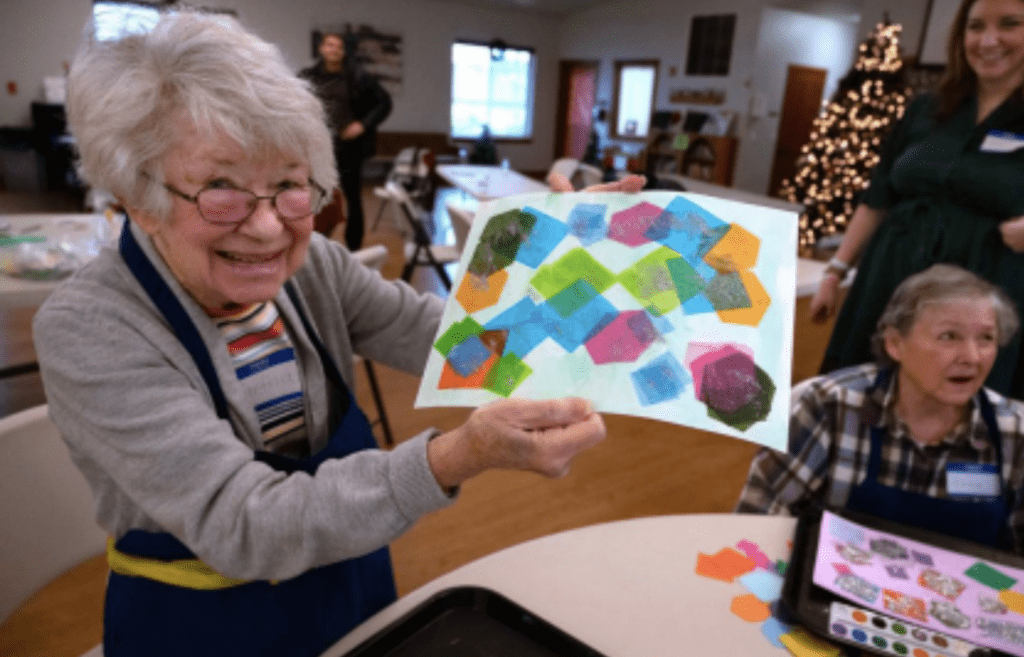
Graves’ husband, Don, has seen positive changes in Karen. The Edgewood couple are both 82. Dementia has robbed Karen of retaining short-term memories, but she recognizes Martha each week.
“She enjoys participating with the people and she’s kind of bonded with Martha,” Don said. “So that’s been good for her, both with social and creative aspects.”
During a recent class, Karen dutifully worked on her art project while periodically switching her gaze and conversation to other participants and volunteers before returning to her work.
CAREGIVERS
Participants don’t need to attend the sessions with their caregivers, Arndt said, but they can. The classes can strengthen bonds and help caregivers see their loved one in a different light, she said.
“It’s very frustrating to be a caregiver because your relationship changes from being the partner to kind of being the director,” Arndt said.
In the sessions, the participants have their own autonomy.
“This is like their time,” she said. “And then in that, the caregiver then sees that happy, artistic, engaging attitude.”
BETHANY
Gary Leaf has been bringing his 35-year-old daughter Bethany to the classes for two years.
“When we started, she was just a spectator,” Gary said. Now, Bethany, who has autism, is an active participant.
“Take the brush,” Gary advised Bethany as he handed her a paintbrush. “It’s a little challenging at times with her autism,” he said.
Bethany has only a one word vocabulary: Dada. But her grin says a lot.
